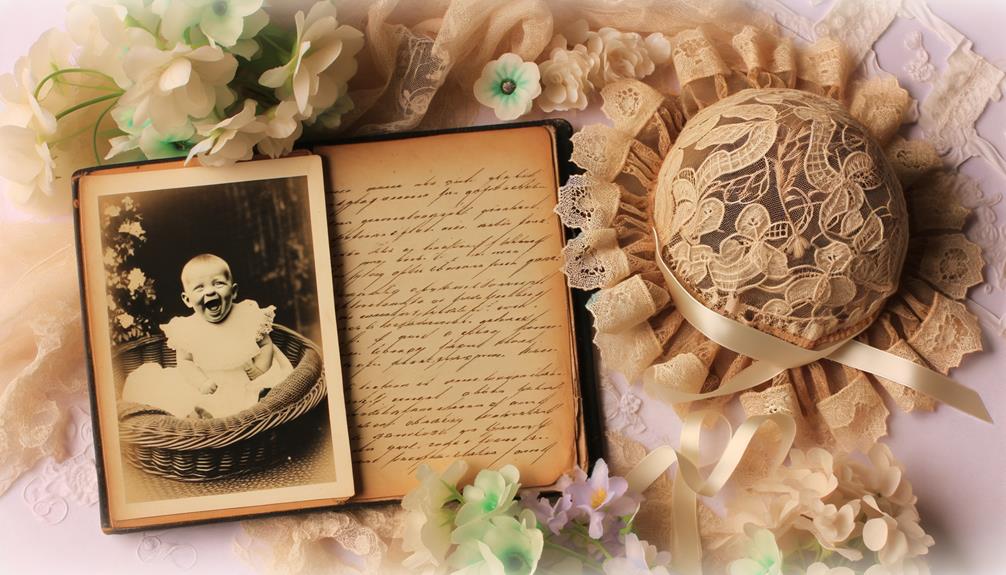Annie Name Meaning and Origin
The name 'Annie' is derived from the Hebrew name 'Hannah,' which means 'grace' or 'favor.' This name has profound spiritual significance rooted in biblical heritage. Annie became popular in Victorian England and has appeared in literature, music, and film, such as the 1982 movie "Annie." Variations include Ann, Anika, and Anaïs, reflecting different cultural influences.
The enduring appeal of the name is due to its association with virtuous qualities and its widespread adoption across various cultures and time periods. This synthesis of historical, literary, and societal factors accounts for its continued popularity and cultural resonance.

Key Takeaways
- 'Annie' is rooted in the Hebrew name 'Hannah,' meaning 'grace' or 'favor.'
- The name has a deep spiritual significance and biblical heritage.
- It gained popularity in Victorian England and spread globally through the English language.
- Variations include Ann, Anika, Annie, and Anaïs, reflecting cultural preferences.
- 'Annie' remains popular in modern culture, featuring in films, literature, and music.
Historical Roots
Rooted in the Hebrew name 'Hannah,' the name Annie has historical significance that spans centuries and various cultures. This evolution reflects a rich tapestry of linguistic and cultural transformations.
During the Middle Ages, the name was adopted by English-speaking populations, where it became a diminutive form of 'Ann' or 'Anne.' Subsequently, it was popularized in Victorian England, where diminutives gained favor as affectionate and approachable alternatives to formal names.
Additionally, the name Annie appeared frequently in literature and song, further embedding it in cultural consciousness. The global spread of English solidified its use across different societies, making it a timeless choice.
The name's journey illustrates the dynamic nature of language and the interplay between cultural identity and personal nomenclature.
Hebrew Meaning
The name Annie finds its roots in the Hebrew name Hannah, which means 'grace' or 'favor.'
This biblical origin underscores its profound cultural and religious significance, reflecting virtues highly valued in Hebrew tradition.
Understanding the etymology and historical context of Annie enriches its contemporary usage and cultural resonance.
Biblical Roots Explained
In examining the biblical roots of the name Annie, it is derived from the Hebrew name Hannah, which means 'grace' or 'favor.' This etymological connection is significant within the context of the Old Testament, where Hannah is a prominent figure.
Remarkably, Hannah is the mother of the prophet Samuel and is renowned for her devout faith and fervent prayers to God. The name Hannah, and by extension Annie, encapsulates themes of divine grace and favor, reflecting Hannah's gratitude for God's blessings.
The linguistic shift from Hannah to Annie illustrates the evolution of names across cultures and epochs, retaining the core meaning while adapting to various linguistic forms. Hence, the name Annie carries with it a profound biblical heritage. The name Annie is derived from the Hebrew name Hannah, which means “grace” or “favor. ” This biblical significance is preserved in the name Annie, as it embodies the same meaning. In fact, the ada name meaning is closely linked to the concept of grace and favor, reflecting the timeless and universal significance of the name.
Meaning of Annie
Building on the biblical heritage, the Hebrew meaning of the name Annie signifies 'grace' or 'favor', derived from Hannah. This etymological connection to Hannah, a pivotal figure in the Old Covenant, underscores the name's deep spiritual resonance. The Hebrew word 'חַנָּה' (Channah) directly translates to 'grace', imbuing the name Annie with connotations of divine favor and kindness.
| Hebrew Term | Meaning |
|---|---|
| חַנָּה | Grace |
| חֵן | Favor |
| אֲנָה | Answer |
| רַחֲמִים | Compassion |
| נָעִים | Pleasant |
Cultural Significance of Annie
Many cultural narratives and traditions have embraced the name Annie, highlighting its Hebrew roots that symbolize grace and favor. This significance is reflected in various aspects of cultural history and practices.
The name Annie, derived from the Hebrew name Hannah, has permeated various societies, often associated with virtuous and empathetic qualities.
- Religious Texts: In the Bible, Hannah is a figure of devout faith and maternal devotion, exemplifying grace.
- Literature: Classical literature often uses the name Annie to depict characters embodying kindness and benevolence.
- Naming Trends: Across different eras, the name Annie has been popular for its gentle and favorable connotations.
- Modern Media: In contemporary culture, characters named Annie frequently possess qualities of compassion and integrity.
This multifaceted resonance underscores Annie's enduring cultural significance.
Cultural Significance
The name Annie has permeated various cultures and societies, often symbolizing grace, resilience, and kindness. In literature and media, characters named Annie frequently embody virtues such as compassion and strength, reinforcing these symbolic associations.
For instance, the character Annie in the musical 'Annie' represents optimism and perseverance in the face of adversity. Additionally, in historical contexts, notable figures named Annie, such as Annie Oakley, are celebrated for their pioneering spirit and determination.
The name's cultural resonance is further amplified by its use across different languages and regions, each imbuing it with unique connotations while maintaining its core attributes. This widespread cultural significance underscores Annie's enduring appeal and multifaceted nature, transcending temporal and geographical boundaries.
Popularity Over Time
The name Annie has experienced different levels of popularity across different decades, influenced by both cultural and societal trends. Regional variations further highlight the name's fluctuating appeal, with some areas showing consistent preference while others demonstrate sporadic interest.
Influential cultural factors such as literature, media, and prominent public figures have greatly impacted the name's standing over time.
Trends Through Decades
Analyzing the popularity of the name Annie reveals distinct trends and shifts across different decades. Historical data highlights its fluctuating appeal, driven by cultural, social, and media influences.
Key observations include:
- Early 1900s: Annie was consistently popular, reflecting its classic charm.
- Mid-20th Century: A decline in usage, possibly due to evolving naming conventions.
- Late 20th Century: A resurgence, influenced by media and pop culture (e.g., the musical 'Annie').
- 21st Century: Moderate but steady popularity, benefiting from a trend towards vintage names.
These trends demonstrate the dynamic nature of name popularity, influenced by a complex interplay of factors. Understanding these shifts provides a detailed view of Annie's enduring appeal across generations.
Regional Popularity Variations
Examining the name Annie's popularity across different regions reveals intriguing variations influenced by local cultural, historical, and demographic factors.
In English-speaking countries such as the United States, the United Kingdom, and Australia, Annie has experienced fluctuating popularity, often tied to historical periods and generational naming trends.
In contrast, Scandinavian countries have shown a more consistent preference for Annie, reflecting the name's alignment with traditional Nordic naming conventions.
Regional dialects and linguistic preferences also play a role; for instance, in French-speaking regions, the variant Annette may be more prevalent.
Additionally, migration patterns and cultural exchanges impact regional preferences, with areas experiencing significant international influence often showing a blend of naming conventions.
These factors collectively shape the geographical popularity of the name Annie.
Influential Cultural Factors
Cultural phenomena such as literary works, films, and prominent public figures have greatly influenced the popularity of the name Annie over different historical periods. Significantly, the name has seen various peaks and declines due to these influences.
Among the significant factors are:
- Literature: The classic poem 'Annie Laurie' by William Douglas.
- Film and Musical Theatre: The enduring popularity of the musical 'Annie,' and its subsequent film adaptations.
- Public Figures: Influential personalities like Annie Oakley, the famed sharpshooter.
- Television: Characters in popular TV shows, such as Annie Edison from 'Community.'
These elements have each contributed to shaping the cultural resonance and enduring appeal of the name Annie, reflecting its dynamic historical trajectory.
Famous Annies
Among the notable individuals named Annie, several have achieved prominence across various fields such as literature, entertainment, and activism.
In literature, Annie Proulx stands out as a Pulitzer Prize-winning author known for her novel 'The Shipping News.'
In the domain of entertainment, Annie Lennox has garnered international acclaim as a musician and singer, particularly as part of the duo Eurythmics.
Activism is represented by Annie Besant, a prominent figure in the Theosophical Society and an advocate for women's rights.
These Annies have made significant contributions to their respective domains, showcasing the versatility and impact of individuals bearing this name across diverse sectors of society.
Their achievements continue to inspire and influence contemporary discourse.
Variations and Diminutives
Exploring the variations and diminutives of the name Annie reveals a rich tapestry of linguistic adaptations and cultural nuances. Derived from the Hebrew name Hannah, meaning 'grace,' Annie has evolved into several forms influenced by different languages and regions.
These variations not only reflect phonetic adjustments but also cultural preferences and historical contexts.
- Ann: A common English variation that retains the simplicity and grace of the original.
- Anika: A Scandinavian and Slavic diminutive, adding a regional touch.
- Annie: The diminutive itself, often used affectionately in English-speaking countries.
- Anaïs: A French variation that offers an elegant and unique twist.
These variations highlight the adaptability of the name, making it a versatile choice across cultures and languages.
Modern Usage
In contemporary contexts, the name Annie continues to showcase its enduring attraction and versatility across various social and cultural landscapes. Its usage spans multiple sectors, reflecting its flexibility and timeless allure.
| Sector | Usage Example | Importance |
|---|---|---|
| Popular Culture | Annie (1982 film) | Iconic portrayal in media |
| Literature | 'Annie John' by Jamaica Kincaid | Literary recognition and thematic depth |
| Music | 'Annie's Song' by John Denver | Emotional and creative expression |
| Social Trends | Popular baby name rankings | Persistent popularity among new parents |
This flexibility guarantees that Annie remains significant, bridging generational differences while preserving its traditional essence. The name's continuous presence in popular culture, literature, music, and social trends highlights its diverse appeal.
Conclusion
The name Annie possesses deep historical roots with a Hebrew origin, signifying 'grace' or 'favor.' Its cultural significance is evident through its sustained popularity and the numerous notable individuals who have borne the name.
Variations and diminutives reflect its adaptability across different cultures and time periods.
An intriguing statistic reveals that in the early 20th century, Annie consistently ranked among the top 20 names for girls in the United States, highlighting its enduring appeal and timeless charm.






